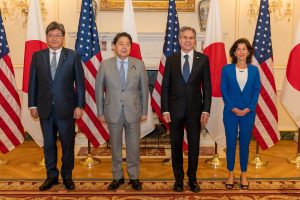The Japan-U.S. alliance is one of the cornerstones of Japan’s foreign policy and the Indo-Pacific region and has evolved its nature with the changing times in the international arena. The alliance, once purely security-oriented and focused on mutual defense, has over time come to include regional security and prosperity.
The U.S.-Japan Economic Policy Consultative Committee (the Economic 2+2), which held its first meeting on July 29, was one such step toward deepening the alliance between the two nations. This meeting was a timely one, as both countries are struggling with the reality that economic security is a vital part of national security.
In recent times, foreign policy dynamics have evolved to be quite complex in terms of trade and technological developments impacting national security. Between the digital transformation, which increases concerns about cyberattacks, and the potential for supply chain disruptions, economic concerns can have a direct impact on security matters.
For decades, the two nations have held “two-plus-two” talks between the foreign and defense officials of the two countries, focused on discussing security issues. They came up with the idea of developing an economic forum on the same lines in January 2022.
The Economic 2+2 was attended by Minister for Foreign Affairs Hayashi Yoshimasa and Minister of Economy, Trade, and Industry Hagiuda Koichi from Japan, and, from the U.S. side, Secretary of State Antony Blinken and Secretary of Commerce Gina Raimondo.
The Economic 2+2 between Japan and the U.S. looks to both build an economic order and ensure sustainable economic growth. The allies want to coordinate progress on advanced technologies to build an effective economic order that will help realize a free and open Indo-Pacific. The Japanese ministers showed their desire for Japan to cooperate with the Indo-Pacific Economic Framework (IPEF) of the United States and also work on cooperation in areas of human rights and the digital economy. As the world tries to recover from the pandemic, which caused supply chain disruptions, and the Ukraine crisis that has threatened global energy and food security, this economic forum focused on strengthening supply chain resilience, protecting critical emerging technologies and also stabilizing energy supplies.
One of the major focus areas in this Economic 2+2 has been Japan-U.S. joint R&D on critical and emerging technologies, which include semiconductors. The two countries plan to establish a new R&D institution, most likely to be set up in Japan by the end of this year, to research 2-nanometer semiconductor chips. The need for Japan-U.S. cooperation on export controls is also vital, along with strengthening semiconductor supply chain resilience. The world’s semiconductor manufacturing capacity is majorly concentrated in East Asia, with Taiwan accounting for the biggest chunk, around 20 percent. Japan and the United States have also vowed to build a strong battery supply chain that would lead to better collaboration between like-minded nations.
Ministers of both nations concurred on the desire for Japan and the United States to work toward maintaining a free and open rules-based international economic order and also focus on international cooperation in areas of economic policy of both Japan and the U.S. This economic committee has been built upon the idea of building reliable energy supply chains and further countering China’s attempts to steal technology and use its economic strength for its own strategic gain. “As the world’s first- and third-largest economies, it is critical that we work together to defend the rules-based economic order, one in which all countries can participate, compete and prosper,” Blinken said.
According to Japanese officials, the regional security environment is the worst seen since World War II, owing to China’s pressure in the East China Sea, tensions in the Taiwan Strait, and increased provocations from North Korea. Therefore, these threats have made increased partnership between Japan and the United States even more important than ever. In a meeting with U.S. President Joe Biden in May, Japan’s Prime Minister Kishida Fumio put forth his commitment to reinforce Japan’s defense capabilities and increase the defense budget to cope with the worsening regional security environment.
Japan and the U.S. aim at making their economies more competitive and resilient by countering the threats to economic security and to the rules-based international economic order. The U.S.-Japan Economic Policy Consultative Committee can perhaps prove to be a solution maker for promoting economic growth and also for addressing threats to the global economic order to enhance economic security. Japan-U.S. ties can also focus on engaging multilaterally, such as with Australia or South Korea, to address the issues raised in the Economic 2+2. Since Japan is preparing itself to make concrete decisions regarding its national security in the coming months, we should keep a close eye on how Japan reimagines and reinvigorates the institutions of the Japan-U.S. alliance and the Economic 2+2.
































